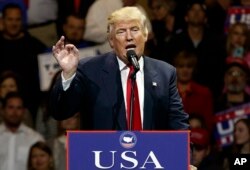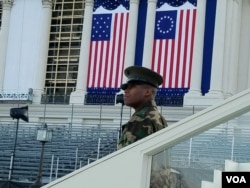Senior members of U.S. President-elect Donald Trump's administration say they are considering moving White House press briefings to a new location with more space, but reporters oppose the proposal saying it would hurt their ability to do their jobs.
The briefings take place in a room in the West Wing of the White House, which has about 50 seats and work spaces for television, radio and print reporters who cover the president on a daily basis.
Trump's Chief of Staff Reince Priebus told ABC News on Sunday there were discussions about moving briefings to a building next door to the White House that could provide four times as much space. He cited the number of journalists who attended Trump's first press conference since his election, held last week in New York, saying if more people were involved, "that would be a good thing."
Vice President-elect Mike Pence told CBS News that no decisions have been made yet.
White House Correspondents' Association President Jeff Mason met Sunday with Sean Spicer, who as Trump's press secretary will be the one answering reporters' questions at the daily briefings.
Mason said the group has always advocated for "increasing access and transparency" to benefit the public, but that he made clear to Spicer a move out of the West Wing would be "unacceptable."
"Access in the West Wing to senior administration officials, including the press secretary, is critical to transparency and to journalists' ability to do their jobs," Mason said in a statement.
Trump wrote on Twitter Sunday that the media should apologize for reporting on unsubstantiated claims that Russia had a file of compromising information about Trump. He also criticized NBC News and the NBC sketch show Saturday Night Live, which began its latest episode with a scene about Trump's press conference.
Upcoming inauguration
Trump takes the oath of office as the 45th U.S. president on Friday at noon in Washington, as President Barack Obama leaves after eight years as the American leader.
"Inauguration Day is turning out to be even bigger than expected," Trump claimed in another tweet.
On Sunday, military units staged a rehearsal for the event. Hundreds of thousands of people, some of them protesters against Trump's victory, are expected to crowd the capital city's National Mall to witness his swearing-in, his inaugural address and his afternoon parade down Pennsylvania Avenue from the Capitol to the White House.
One Army band member, vocalist Greg Lowery, played the role of Trump in the rehearsal, saying he wanted to "look the part as much as possible" of the incoming president, even buying a red tie for the occasion, just as Trump often wears.
As Trump assumes power, he faces a country still divided over his election. Already unpopular when he was elected, one poll showed Trump's approval rating on a variety of assessments has dropped even further since the November 8 balloting.
Controversies surrounding the election are still consuming political Washington.
Assorted controversies
Debates fill news shows about the U.S. intelligence community's conclusion that Russia meddled in the election through hacking of a key Democrat's computer to try to help Trump win, and a Justice Department watchdog's announcement last week that he would examine the role Federal Bureau of Investigation director James Comey played in his handling of an investigation of Clinton's use of an unsecured private email server while she was secretary of state from 2009 to 2013.
At least 18 Democratic lawmakers are saying they will boycott Trump's inauguration.
Civil rights icon John Lewis said Trump is not a "legitimate president" because of the Russian hacking of thousands of emails of Clinton campaign chief John Podesta.
Trump assailed Lewis in a Twitter comment Saturday, saying he should spend more time working to improve life in his Atlanta, Georgia congressional district, "rather than falsely complaining about the election results."
Vice President-elect Pence on Sunday called Lewis's comments questioning the legitimacy of Trump's election "deeply disappointing" and said he hopes Lewis will reconsider them.
On Fox News, outgoing Central Intelligence Agency director John Brennan criticized Trump's penchant for "talking and tweeting," saying it was not in U.S. interests.
Brennan, likely to soon be replaced by CIA director-designate Kansas Congressman Mike Pompeo, said national security issues Trump will face are not "about him."
Brennan said Trump is "going to have an opportunity to do something for our national security as opposed to talking and tweeting."







